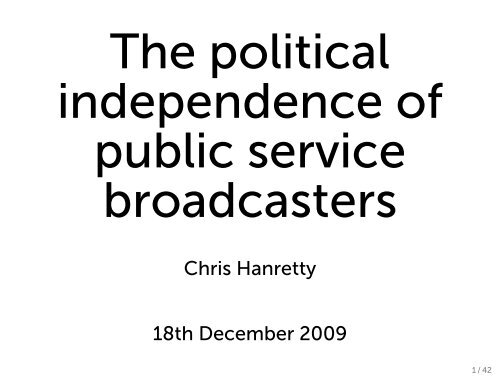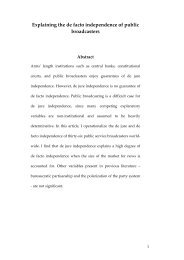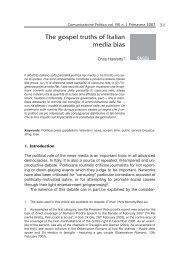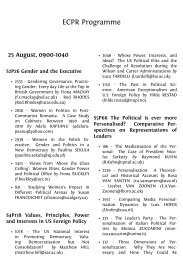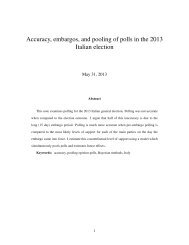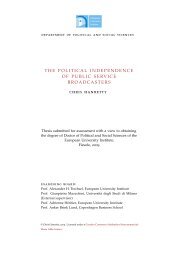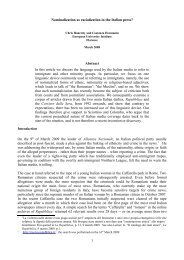here they are - Chris Hanretty
here they are - Chris Hanretty
here they are - Chris Hanretty
Create successful ePaper yourself
Turn your PDF publications into a flip-book with our unique Google optimized e-Paper software.
The political<br />
independence of<br />
public service<br />
broadcasters<br />
<strong>Chris</strong> <strong>Hanretty</strong><br />
18th December 2009<br />
1 / 42
Definitions<br />
Political independence<br />
Public service broadcaster<br />
Hypotheses<br />
Legal protection<br />
News market<br />
Statistics<br />
Measurement<br />
Histories<br />
Case selection<br />
A typical North European story<br />
The Southern European `non-story'<br />
Conclusion<br />
2 / 42
Definitions<br />
3 / 42
What is political independence?<br />
What would<br />
demonstrate a<br />
lack of political<br />
independence?<br />
4 / 42
Formally...<br />
• the degree to which PSB employees take<br />
day-to-day decisions about their output or<br />
the output of subordinates, without<br />
• receiving and acting on the basis of<br />
instructions, threats, or other inducement<br />
from politicians, or the anticipation t<strong>here</strong>of;<br />
• or considering whether the interests of those<br />
politicians would be harmed by particular<br />
choices about output.<br />
5 / 42
What is a public service<br />
broadcaster?<br />
• Organizations like the BBC, Rai, Corporation<br />
for Public Broadcasting (USA)<br />
• ... but not like Channel 4 or TV2 (Denmark)<br />
6 / 42
Formally...<br />
A broadcasting organization which is<br />
• funded through some form of taxation (inc.<br />
licence fee)<br />
• broadcasts to residents of same state that<br />
funds it (no Voice of America)<br />
• with stated aim of broadcasting a wide range<br />
of socially useful material<br />
• and w<strong>here</strong> the top posts <strong>are</strong> appointed by the<br />
state<br />
7 / 42
Hypotheses<br />
8 / 42
Two hypotheses<br />
1. The greater the legal protection enjoyed by<br />
the broadcaster, the more independent it will<br />
be<br />
2. The larger the market for news in the country<br />
of the broadcaster, the more independent it<br />
will be<br />
9 / 42
Legal protection<br />
• Politicians have legal means to sanction or<br />
reward the broadcaster<br />
• Appointments, funding, inquiries, and so on<br />
• The more limited these means, the more<br />
limited the sanctioning (rewarding)...<br />
• ... and the more independent the broadcaster<br />
10 / 42
Size of the market for news<br />
• Bigger market for news (per capita), more<br />
journalists (per capita)<br />
• More journalists, journalists associations, wire<br />
services start<br />
• Professional norms develop...<br />
• ...which can then be repurposed by PSBs to<br />
defend themselves<br />
11 / 42
Cover 29/6/05 3:32 pm Page 1<br />
Key examples<br />
EDITORIAL GUIDELINES<br />
The BBC’s Values and Standards<br />
www.bbc.co.uk/editorialguidelines<br />
• BBC borrowed their first<br />
rules for editing news from<br />
Reuters<br />
• Sveriges Radio borrowed<br />
their first editorial guidelines<br />
wholesale from the Swedish<br />
Journalists' Union<br />
12 / 42
Statistics<br />
13 / 42
Measurement<br />
• Statistical models provide rigour, precision<br />
• But require our items of interest to be<br />
quantified<br />
• How to do that for our two independent<br />
variables -- size of the market for news and<br />
legal protection?<br />
• How to do that for our dependent variable,<br />
political independence?<br />
14 / 42
Size of the market for news<br />
• Use press circulation per capita as a measure<br />
of market size<br />
• Postpone point about professional<br />
development<br />
• ranges from 75 copies per 1,000 population<br />
(Greece) to > 500 (Sweden)<br />
15 / 42
Legal protection<br />
• Build an index of legal protection<br />
• 13 index items, each scored in the interval [0,1]<br />
• Includes items on reporting, funding &<br />
borrowing, appointment, dismissal, and<br />
tenure<br />
• More independent responses scored higher<br />
16 / 42
Example: funding<br />
• Automatically uprated<br />
licence fee: 1<br />
• Discretionally uprated<br />
licence fee: 0.75<br />
• Advertising: 0.5<br />
• Pluri-annual grant from<br />
parliament: 0.25<br />
• Annual grant from<br />
parliament: 0<br />
17 / 42
Political independence<br />
• We can't tackle this directly<br />
• We must use a proxy<br />
• My proxy is executive turnover<br />
18 / 42
Formally...<br />
Independence =<br />
w<strong>here</strong><br />
(1−T OR)+(1−V UL)<br />
2<br />
• TOR = Chief executive turnover (reciprocal of<br />
avg. duration)<br />
• VUL = Percentage of govt. changes followed<br />
within six months by change of executive<br />
19 / 42
Example: Austria<br />
• Fourteen changes of government in the<br />
period<br />
• Two of these followed within six months by<br />
change in DG of ÖRF<br />
• So VUL = 2 14 = 0.14<br />
• Average tenure of ÖRF DG was 5 years 1<br />
month<br />
• So TOR = 1<br />
5.083<br />
• and the independence score is 0.86+0.803<br />
2<br />
= 0.83<br />
20 / 42
More intuitively...<br />
>0.9<br />
>0.8<br />
>0.7<br />
>0.6<br />
>0.5<br />
Results<br />
Independence = -0.126 +<br />
0.411 × Legal protection +<br />
0.125 × Market size<br />
-0.038 ×<br />
(Market size × PostCommunist)<br />
which explains around half of the variance (N=36)<br />
22 / 42
Histories<br />
23 / 42
Historical analysis<br />
• Statistical analyses <strong>are</strong> good for some things<br />
• but it's not always convincing<br />
• and I can't treat the use of professional norms<br />
statistically<br />
So an analysis of specific cases is needed.<br />
24 / 42
Case selection<br />
• 6 cases chosen<br />
• 2 from each of<br />
Hallin &<br />
Mancini's<br />
(2004)<br />
• 3 types of<br />
media system<br />
25 / 42
Rai<br />
RTVE<br />
26 / 42
Rai<br />
RTVE<br />
BBC<br />
RTÉ<br />
27 / 42
Rai<br />
RTVE<br />
BBC<br />
RTÉ<br />
SVT<br />
DR<br />
28 / 42
Rai<br />
RTVE<br />
BBC<br />
RTÉ<br />
SVT<br />
DR<br />
29 / 42
A typical (North European) story (1)<br />
A public broadcaster is<br />
formed.<br />
30 / 42
A typical (North European) story (2)<br />
• The press gets worried.<br />
• They push for a<br />
monopoly on broadcast<br />
news.<br />
• This leads to fatally dull<br />
but reliable news.<br />
31 / 42
A typical (North European) story (3)<br />
A forceful chief executive<br />
decides that such rules can<br />
help him protect the<br />
company.<br />
32 / 42
Cover 29/6/05 3:32 pm Page 1<br />
www.bbc.co.uk/editorialguidelines<br />
A typical (North European) story (4)<br />
EDITORIAL GUIDELINES<br />
The BBC’s Values and Standards<br />
Rules <strong>are</strong> created, borrowing<br />
from wire agencies or<br />
journalists' unions.<br />
33 / 42
A typical (North European) story (5)<br />
Rules <strong>are</strong> then “trotted out to<br />
every earnest American<br />
researcher that comes along”.<br />
34 / 42
A typical (North European) story (6)<br />
• Politicians <strong>are</strong> (almost)<br />
happy.<br />
• Why? Because a<br />
rule-following public<br />
broadcaster is not a<br />
partisan one.<br />
• Why? Because<br />
complaints can be<br />
adjudicated.<br />
35 / 42
What about the Southern<br />
European story? (1)<br />
• Weak press interests<br />
• So no agency copy<br />
• (But lots of government press releases)<br />
36 / 42
What about the Southern<br />
European story? (2)<br />
• Some strong chief executives<br />
• But r<strong>are</strong>ly interested in news<br />
• And often unable to impose a set of rules on<br />
journalists<br />
37 / 42
What about the Southern<br />
European story? (3)<br />
We can’t be continually attacked from the<br />
outside... and have to go forward without<br />
even some cover from [the board]. Give<br />
me a document I can hold on to, and<br />
from which I can give instructions<br />
-- Biagio Agnes, former DG of Rai<br />
38 / 42
Country<br />
Market<br />
for news<br />
p/c<br />
Table: Comparison of countries<br />
Press<br />
monopoly<br />
on b/c news<br />
Internal<br />
codes<br />
Ombudsman/<br />
complaints<br />
board<br />
Independence<br />
Sweden Large Yes Yes (1960-) Yes (1933-) High<br />
UK Large Yes Yes (1987-) Yes (1971-) High<br />
Ireland Moderate No Yes (1989-) No Moderate<br />
Denmark Moderate Yes Yes (2003-) Yes (2004-) Moderate<br />
Italy Small No (Rai) No No Low<br />
Spain Small No No Yes (2007-) Low<br />
39 / 42
Conclusions<br />
40 / 42
Conclusions<br />
The size of the market for news and the<br />
degree of legal protection enjoyed by the<br />
broadcaster explain the degree of political<br />
independence had by the broadcaster<br />
• This is not a complete explanation<br />
• It works best for Sweden, the UK, and Spain<br />
• it works less well for Italy and Denmark<br />
• and some key factors <strong>are</strong> missing<br />
41 / 42
Thank you<br />
<br />
<br />
42 / 42


